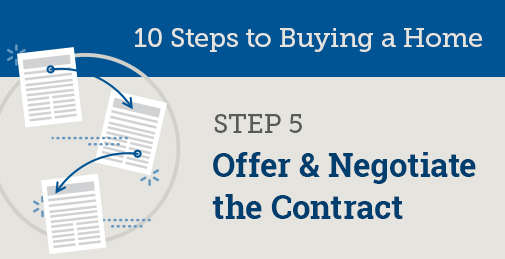
As a buyer, finding the perfect home in a realistic budget can be one of the most exciting purchases in a lifetime. Now that the desired home has been found, it’s time to create a contract in coordination with the buyer and their agent. A contract, or purchase offer, is a legal transaction that outlines how much you want to pay for the home, all terms and conditions of the purchase, and legal requirements based on state and local laws. Buyers, sellers, agents and the chosen title company are all involved in the coordination of the successful accepted offer.
You will work with your agent to determine what is an acceptable offer on the property. Trust the agent’s advice as they know the area extensively and can dictate if the asking price for the home is above the value of the home. Hot markets may also require a higher offer price dependent on bidding wars. No matter what your proposed offer is, consider these tips and questions when making an offer on a home.
- Condition of Home: Does the home need minimal or extensive renovations? Are these renovation projects something you can handle as the buyer? Will you need to hire contractors? These questions should affect the offer to the sellers.
- Are there HOA limits? There may be numerous renovations that could improve the home, but these must fall within HOA guidelines. This can affect the price presented as some restrictions may increase or decrease the value of the home.
- Pet Laws: Consider if four-legged friends are accepted in the community or neighborhood desired. Many breeds such as Pit Bulls, Dobermans, Rottweilers and Chows are restricted. Weight limits can also be an issue.
Research Contract Language
As with any contract, the language within can be confusing for even the most knowledgeable of buyers. Research and ask your agent to explain standard stipulations in a real estate contract to help make the decision quick for contract offers. For example, in many areas a home inspection must occur within 14 days unless otherwise mentioned in the contract. Who pays for this home inspection is something that can be negotiated and must be mentioned in the offer.
Speaking with a real estate attorney is another option for those that wish to be 100% sure that an offer is legal, fair and beneficial. Don’t be afraid to ask the agent or real estate lawyer any question. No question is silly when making such a large purchase.
Set The Price
The offer price is the final number brought to the seller for the property. As mentioned above, work with the agent to determine a fair price for the home. Is the area a buyer’s market or a seller’s market? Have homes sat on the market for extended periods of time? Will this home require serious renovation? Is the asking price set to the comparable market value for the area?
Down Payments
The lender can help determine an acceptable down payment on a home based on how it affects the mortgage payment and what is an attractive escrow amount for the seller. In previous years, a FHA or Conventional loan down payment was as high as 20%. After the market drop, this has decreased significantly. In 2017, the median down payment was 10%. A down payment is not required with VA loans, but VA funding fees will be required at the closing which can either be rolled into the mortgage or paid at closing. The types and requirements of loan options can be confusing, work with your lender to find the option best for you.
There are also payment assistance programs available that assist homeowners in specific areas, incomes, ethnicities and additional criteria with providing funds for down payments on homes. To determine what the monthly mortgage payment will be based after the down payment, ask the lender to run the numbers, and/or use mortgage calculators to determine the estimated payment per month.
Earnest Money Deposits (EMDs)
An Earnest Money Deposit (EMD) is an initial deposit submitted with an offer to show a seller that the buyer is serious about purchasing the home. This can range between $1,000-$10,000 depending on the price of the home and the area. This deposit will be held in escrow by the title company and go towards the closing of the home. Note: If the buyer backs out of the deal, the buyer may lose this deposit. Choose wisely and read the contract carefully.
An Offer is More Than a Number
A final number is extremely important to an offer, but other stipulations and instances affect whether an offer is in favor of a buyer or seller. Here are some additional items to consider when providing an offer.
- Form of Payment: All cash offers are extremely attractive to sellers as this removes lender contingencies and takes the concern away from the seller as to if a buyer can truly qualify for the loan.
- Clear Title: If a home does not have clear title, outstanding permits and/or code enforcement issues, this can take additional funds to clear. The contract should dictate in the additional terms who will take care of these issues, whether the buyer or seller. Usually buyers ask sellers to fix and provide an asking price that reflects the headache.
- Outstanding Taxes/Utilities: If taxes or utility bills are outstanding, this should be reflected in the contract as well.
- Deeds: There are numerous types of deeds including: General Warranty Deeds, Special Warranty Deeds, Deeds Held by Trusts and Deeds Executed by Courts (Foreclosures). Each has their own pros, cons and headaches. Discuss these differences with the agent and lender and adjust the price dependent of the situation.
- State Specific Clauses: Each state has their own rules regulations to follow for transactions. Discuss these differences with the agent before submitting a final offer.
Contingencies
Contingencies are steps or provisions that must be met before the final transaction goes through (they keep the seller and buyer accountable and protected). Each agent (buyer & seller) should hold each other accountable to ensure that these are done in a timely manner as discussed in the contract and by the appropriate party. These seem like easy steps, but can hold up a closing more often than expected.
Other Contingencies:
- Financial: Missing Lender Docs
- Appraisal: Delayed Production of Docs
- Clear Title: Title Company Misses Information
- Home Sale: Seller Needs More Time to Vacate, Buyer’s Current Home Sale is Delayed
Fine Print: Understanding the contract is so important. Be sure to read over all the fine print and discuss with the agent to not miss any discrepancies.


